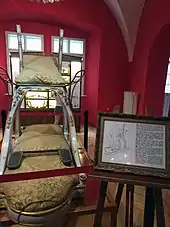Erotic furniture
Erotic furniture, also known as sex furniture, is any form of furniture that is designed to act as an aid to sexual activity. This includes furniture and harnesses designed to aid positioning,[1] assisting with comfort, penetration level and stimulation.[2] Other types of erotic furniture are constructed to be an aid to erotic bondage. The functionality may be obvious or the erotic furniture may be designed to appear as conventional furniture.[3] Some conventional items of furniture such as the four-poster bed and the chaise longue traditionally have erotic associations,[4] but they are not considered to be erotic furniture as their primary use is not erotic. Erotic furniture can also be furniture decorated with erotic art.

History
In ancient Assyria there are examples of furniture decorated with erotic reliefs dating to the 13th century BC.[5]
In the 18th century, the Russian Empress Catherine the Great collected erotic furniture, including tables with penises for legs and other items carved in relief with penises and vulvas.[6]
The 1791 French novel Les Délices de Coblentz describes beds that are designed to increase sexual pleasure by virtue of the elasticity of their springs.[7]
The British king Edward VII, who was heavily overweight, used a specially constructed "love chair" (siege d'amour) when he visited the famous brothel, Le Chabanais in Paris. The piece still exists and a replica[8] is exhibited at the Musée de l'Erotisme in Pigalle.[9]
Edward Gorey's The Curious Sofa, (1961) is a neo-Victorian pseudo-porno satire described as a "pornographic illustrated story about furniture". The book consists of euphemistic illustrations with strategically deployed objects, such as potted plants and tree branches, that block the reader's view of sexual activities taking place on furniture.
The British pop artist Allen Jones has designed erotic furniture.[10] His piece Hatstand, Table and Chair, consisting of scantily clad female mannequins converted to items of furniture, was first exhibited in 1970.[11]
In modern times erotic furniture continues to be produced mainly by small businesses rather than large scale manufacturers.[3]
Types

Specifically designed furniture for erotic purposes can include:
- Devices to aid impact play activities such as erotic spanking and flagellation. Examples of this type of furniture include the Berkley Horse and the X-cross.
- Sex swings,[12] either freestanding or temporarily installable in places such as doorways.[13]
- Fisting slings[14]
- Sex gliders (also known as monkey rockers) – rocking stools with built-in dildos[15]
- Devices for using gravity to aid in lovemaking without the use of complicated slings.
- Various types of angled foam wedges or specially designed sex pillows that support various sex positions. Liberator Shapes are an example which can be used to improve g-spot and cervical stimulation.[13] Another example are the ergonomically based Lovebumpers.
- Bondage equipment such as stocks, pillories and cages.
- Smotherboxes and other queening stools used for facesitting.
- Sex chairs and sex sofas, positioning furniture which in some cases have openings to allow for genital or anal access.[13]
- The Love Chair, a chair made of curved tubular steel, articulated in several ways and designed to facilitate otherwise impossible sexual acts. This device was advertised in men's magazines in the mid-1970s, and is seen in at least one of Nina Hartley's Guide to videos, but it is no longer commercially available.
- Wooden horses, which are shaped much like the sawhorses used for carpentry, but have a sharpened edge and are primarily sat on to achieve a feeling similar to a crotch rope in bondage.
- Sybians, a type of sex machine consisting of a vibrating saddle-like seat with an upward-pointing shaft for internal stimulation.[16]
References
- Sheumaker, Helen; Wajda, Shirley, eds. (2007). Material Culture in America: Understanding Everyday Life. Bloomsbury Publishing USA. p. 404. ISBN 9781576076484.
- Rada, Alena (2021). Imposed Morality. Australian Self Publishing Group. p. 579. ISBN 9781925908626.
- Miles, Lucy (22 July 2001). "Move over Ikea... this furniture's for you know what!; Erotic pieces designed for sex". Sunday Mercury. Birmingham, England – via The Free Library.
- Powell, Helena Frith (2006). Be Incredibly Sexy: 52 brilliant ideas for sizzling sensuality. Infinite Ideas. pp. 59–60. ISBN 9781904902553.
- Assante, Julia (2007). "The Lead Inlays of Tukulti-Ninurta I: Pornography as Imperial Strategy". In Cheng, Jack; Feldman, Marian (eds.). Ancient Near Eastern Art in Context. BRILL. p. 369. ISBN 9789047420859.
- Catherine the Great: A Life From Beginning to End. Biographies of Women in History. Vol. 7. Hourly History. 2017. p. 31. ISBN 9781976378379.
- Cryle, Peter Maxwell (2001). The Telling of the Act: Sexuality as Narrative in Eighteenth- and Nineteenth-century France. University of Delaware Press. p. 42. ISBN 9780874137484.
- "On the trail of Edward VII's sex chair for threesomes". The Week UK.
- Dirty Bertie's seat of pleasure, The Times, 17 January 2004
- Dyson, James (2021). Invention: A Life. Simon and Schuster. p. 38. ISBN 9781982188429.
- Gayford, Martin (8 October 2007). "Allen Jones: The day I turned down Stanley Kubrick". The Telegraph. London.
- Taormino, Tristan (2009-12-01). The Big Book of Sex Toys: From Vibrators and Dildos to Swings and Slings--Playful and Kinky Bedside Accessories That Make Your Sex Life Amazing. Quiver. ISBN 978-1-59233-355-4.
- Zane, Zachary (25 July 2022). "10 Pieces of Sex Furniture for When Beds Get Old". Men's Health.
- "What is a Fisting Sling?". Kinkly. 22 January 2018.
- Watson, Angela (8 February 2020). "Sex Glider Buyers Guide: The Best Monkey Rockers Available". Doctor Climax.
- Dickson, EJ (9 July 2021). "Dave Lampert, Inventor of the Sybian Sex Aid, Dead at 90". Rolling Stone.